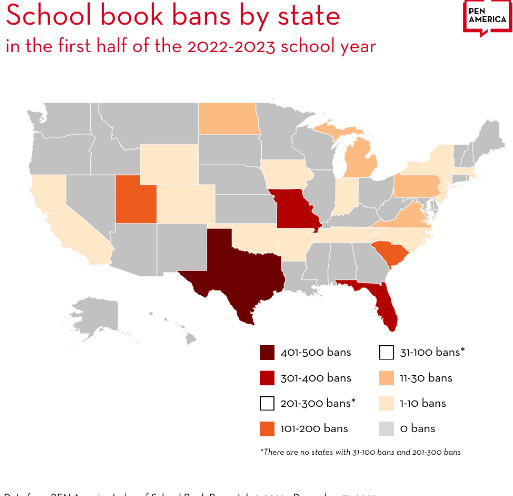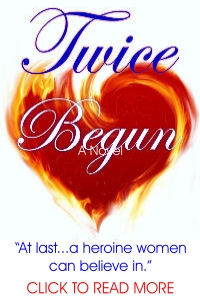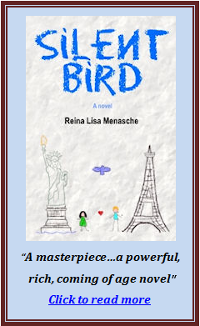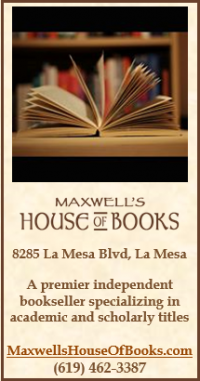 California law seeks to prohibit school districts from banning books
California law seeks to prohibit school districts from banning books
By Branda Gorgies
Images from PEN America and American Library Association
August 13, 2023 (East County) – Recently, book bans have become a hot topic. Some people see them as necessary and others see them as censorship. But if you’re involved in politics, you are more likely than not to have an opinion on book bans.
First off, we need to see how prevalent this is. According to PEN America, this is most commonly happening in Texas, Florida, Missouri, Utah and South Carolina. Texas is responsible for 438 bans in the second half of 2022, Florida for 357 and Missouri for 315. In total, there were 1,477 instances, meaning that Florida and Texas alone make up more than half of book bans in the second half of 2022.
According to the same source, California has 1-10 bans in that same period. However, Assembly Bill 1078 is currently working to halt that. The bill states that schools cannot “[prohibit] the use of an existing textbook, other instructional material, or curriculum that contains inclusive and diverse perspectives.” The bill is currently in the state Senate.
Book bans are outlawed in Illinois, the first and so far, only state to do so, with House Bill 2789.
Arguments for Banning Books
A lot of people who argue for banning books state that it’s because there are certain topics children shouldn’t be exposed to. This is reflected in the reasons for book bans and challenges, which range from witchcraft to racial and sexual content. They also argue that keeping these books out of school libraries isn’t an infringement on the authors’ first amendment right, as they can still write their books, they just won’t be available in schools.
A second argument in support of book bans is parental rights. That’s the argument that parents deserve to have a choice in what their children are being taught in schools. Parents have many ways to get involved with that. There are PTOs/PTAs, governing boards, and so on, that all offer parents the opportunity to get involved in their child’s education. This argument is a step up from that, stating that parents should be involved in the teaching aspect of their child’s education as well.
Overall, the people who argue for book bans do it to keep certain topics outside of schools and to give parents the ability to decide what their children are learning.
Arguments Against Banning Books
A poll by the American Library Association in March of last year showed that 71% of voters are against book bans. Whether this statistic remains the same is unknown, but there are plenty of people that are still against it.
 Those who are anti-bans claim that children should be exposed to diverse and inclusive viewpoints, and banning books obstructs that. This includes the experiences of people of color and LGBT+ people. These communities are most commonly targeted when it comes to bans. In the American Library Association’s 2022 top 13 banned books, seven talk about LGBTQ+ content and five about race. Only three books don’t contain either.
Those who are anti-bans claim that children should be exposed to diverse and inclusive viewpoints, and banning books obstructs that. This includes the experiences of people of color and LGBT+ people. These communities are most commonly targeted when it comes to bans. In the American Library Association’s 2022 top 13 banned books, seven talk about LGBTQ+ content and five about race. Only three books don’t contain either.
Another argument is that while parents do have a right to decide what their kids read, there should still be a variety of books available to choose from. So while the school library may have a book that one parent deems inappropriate, another parent might see that as an informative read for their child. Each gets to decide whether their child can read that book.
One argument that’s not as commonly used is that banning books is inherently anti-democracy and a warning sign for the destruction of it; essentially a slippery slope to fascism. People who use this argument use Nazi Germany as a key example. Nazi Germany was known for burning any book deemed “degenerate” or “un-German.” This included books with topics such as sexuality, gender, race, leftist/liberal politics, books written by Jewish authors and anything they deemed morally wrong.
An infamous Nazi book burning took place on May 10, 1933. They burned over 25,000 books that day. This included books from the Institute of Sexology, an institute that researched sexuality and advocated for the equal treatment of homosexuals, works by Jewish authors such as Albert Einstein and Sigmund Freud and “un-German” works of American authors.
Book Ban Backfires
While many book bans achieve what they were meant to, sometimes they backfire.
In San Diego, two residents checked out all the books involved in a pride month display in a public library. They did so to keep children from accessing the books, but a coalition of people stood up against this move. The library saw donations of books and money, and the two residents returned all the books after their attempt backfired. These funds were matched by the city and put toward LGBT+ materials and programs.
Sometimes, a book ban can bring attention to a book, which leads to an increase in sales from the people who are anti-bans. This happened in the case of Amanda Gorman’s poem, “The Hill We Climb.” It was banned for mentions of race, and what mother Daily Salinas described as “‘indirect hate messages,’ gender ideology and indoctrination,” according to the Miami Herald.
What can happen often, too, is lawsuits. This has happened to two Florida districts this year, once in June, led to lawsuits by authors, students and parents, and the other in May, resulted in litigation led by the publication Penguin Random House, parents, authors and PEN America.
Not as often, but still a major backfire, is book bans being used in an unintended way, such as to ban the Bible. For example, recently the Leon County School District in Florida was challenged by a nontheistic group, Freedom From Religion, in response to the district’s book bans charged by Moms of Liberty. The foundation requested the Bible be banned for its sexually explicit content.
Another similar incident occurred in Florida in 2022. Chaz Stevens, a local activist, sent a petition to school district superintendents all over Florida to ban the Bible for its references to murder, adultery, sexual immorality, fornication, rape, bestiality, cannibalism and infanticide. He did this in response to the state banning 54 math textbooks. This is the same man who challenged Louisiana’s and Texas’ requirement to hang up “In God we Trust” signs by asking for versions of them in different languages, with rainbows and even with pentagrams to be put up.
Lastly, this happened in a Utah school district when a parent complained about the “vulgarity and violence” of the Bible. You can read more on that story here.
Alternatives to Book Bans
A commonly argued alternative to book bans is to use a metric for how age-appropriate a book is. Let’s use a couple of banned books as an example: “And Tango Makes Three,” “All Boys Aren’t Blue” and “Fifty Shades of Grey.”
“And Tango Makes Three” by Justin Richardson is a children’s book about two dad penguins that adopt a baby penguin, Tango. According to Common Sense Media, this book is 4+, making it okay to offer to all school-aged children. While this book can be offered in school libraries for all grades, parents still have the option to keep their children from reading it.
 “All Boys Aren’t Blue” by George M. Johnson is a memoir that recounts his experiences with his blackness, his queerness and the intersection of the two identities. Common Sense Media rates this book as 16+ due to mentions of sex. Keep in mind, the point of the book isn’t to be pornographic, but to recount Johnson’s life. This book would only be offered in high schools.
“All Boys Aren’t Blue” by George M. Johnson is a memoir that recounts his experiences with his blackness, his queerness and the intersection of the two identities. Common Sense Media rates this book as 16+ due to mentions of sex. Keep in mind, the point of the book isn’t to be pornographic, but to recount Johnson’s life. This book would only be offered in high schools.
“Fifty Shades of Grey” by E.L. James is an erotic novel. Unlike “All Boys Aren’t Blue,” the purpose of this book is to be sexually explicit. This book is 18+, so it wouldn’t be offered in any school libraries due to its explicit nature and having little to no intellectual premises.
In each of these cases, how age-appropriate the book is will determine whether or not it should be offered, and the parent gets to decide whether or not their child can read the book.
The Authors’ Viewpoint
The top 13 banned books this year were “Gender Queer: A Memoir,” “All Boys Aren’t Blue,” “The Bluest Eye,” “Flamer,” “Looking for Alaska,” “The Perks of Being a Wallflower,” “Lawn Boy,” “The Absolutely True Diary of a Part-Time Indian,” “Out of Darkness,” “A Court of Mist and Fury,” “Crank,” “Me and Earl and the Dying Girl” and “This Book is Gay.” Below is a quote from each of the authors on censorship of their books.
“For now, I am strengthening my commitment to continue writing stories centering trans, queer, and nonbinary characters. Certain parts of the country may be fixated on censoring me, but I will not be censoring myself.” - Maia Kobabe, author of “Gender Queer: A Memoir,” to NPR in 2023.
“However, I as many other authors remain fervent in our fight to ensure that the young adults who need our literature the most aren't denied from being able to access it.” - George M. Johnson, author of “All Boys Aren’t Blue,” to NPR in 2023.
 “The thought [of book banning] that leads me to contemplate with dread the erasure of other voices, of unwritten novels, poems whispered or swallowed for fear of being overheard by the wrong people, outlawed languages flourishing underground, essayists’ questions challenging authority never being posed, unstaged plays, canceled films — that thought is a nightmare.” - Toni Morrison, author of “The Bluest Eye,” in a collection of essays, “Burn this Book,” published in 2009.
“The thought [of book banning] that leads me to contemplate with dread the erasure of other voices, of unwritten novels, poems whispered or swallowed for fear of being overheard by the wrong people, outlawed languages flourishing underground, essayists’ questions challenging authority never being posed, unstaged plays, canceled films — that thought is a nightmare.” - Toni Morrison, author of “The Bluest Eye,” in a collection of essays, “Burn this Book,” published in 2009.
“There are some taboo themes that I addressed in this book that I’m sure some parents are uncomfortable with. But these are experiences that most teenagers go through.” - Mike Curato, author of “Flamer,” to PEN America in 2023.
“Text is meaningless without context, and what usually happens with ‘Looking for Alaska’ is that a parent shows one particular page of the novel to an administrator and then the book gets banned without anyone, who objects to it, having read more than that one particular page.” - John Green, author of “Looking for Alaska,” in a 2016 YouTube video titled “On the Banning of Looking for Alaska.”
 “Banning books gives us silence when we need speech. It closes our ears when we need to listen. It makes us blind when we need sight.” - Stephen Chbosky, author of “The Perks of Being a Wallflower.”
“Banning books gives us silence when we need speech. It closes our ears when we need to listen. It makes us blind when we need sight.” - Stephen Chbosky, author of “The Perks of Being a Wallflower.”
“The whole affair is a study in disinformation, a microcosm of our times. I say, read the book, or sit your butt down.” - Jonathan Evison, author of “Lawn Boy,” to Katie Couric Media in 2022.
“The problem isn’t that one parent doesn’t want their kid to read the book. The problem is they want to control what every kid reads.” - Sherman Alexie, author of “The Absolutely True Diary of a Part-Time Indian,” to the National Coalition Against Censorship in 2013.
“These book bans do not reflect spontaneous parental concern. Instead, they are part of an orchestrated effort to sow suspicion of public schools as scarily "woke" and to signal opposition to certain identities and topics.” - Ashley Hope Pérez, author of “Out of Darkness,” to NPR in 2022.
“Don't let anyone shame you for what you read or what you love in general. Many people are gonna tell you not to do XYZ things. Do you what you love, and screw the rest.” - Sarah J. Maas, author of “A Court of Mist and Fury,” to The Guardian in 2014.
 “This move to remove books from school libraries denies their power to positively impact and, yes, save lives. School boards meeting these challenges must understand that.” - Ellen Hopkins, author of “Crank,” on Twitter in 2021.
“This move to remove books from school libraries denies their power to positively impact and, yes, save lives. School boards meeting these challenges must understand that.” - Ellen Hopkins, author of “Crank,” on Twitter in 2021.
“The notion that books harm kids is utterly perverse. The harm is done by not teaching them to read.” - Jesse Andrews, author of “Me and Earl and the Dying Girl,” to Deadline in 2023.
“This is why, if an institution chooses to ‘ban’ one of my books, I have to accept that. I have no right to that platform, although I strongly feel nothing I said incites hate, quite the opposite.” - Juno Dawson, author of “This Book is Gay,” to PEN America in 2017.
Where to Report Censorship and Access Banned Books
The Banned Books Week site has a list of various organizations you can contact to report censorship or go to for press inquiries. You can find the list here.
Also available is digital access to various banned books made possible by the New York Public Library. Here’s the link to the project.


















Recent comments